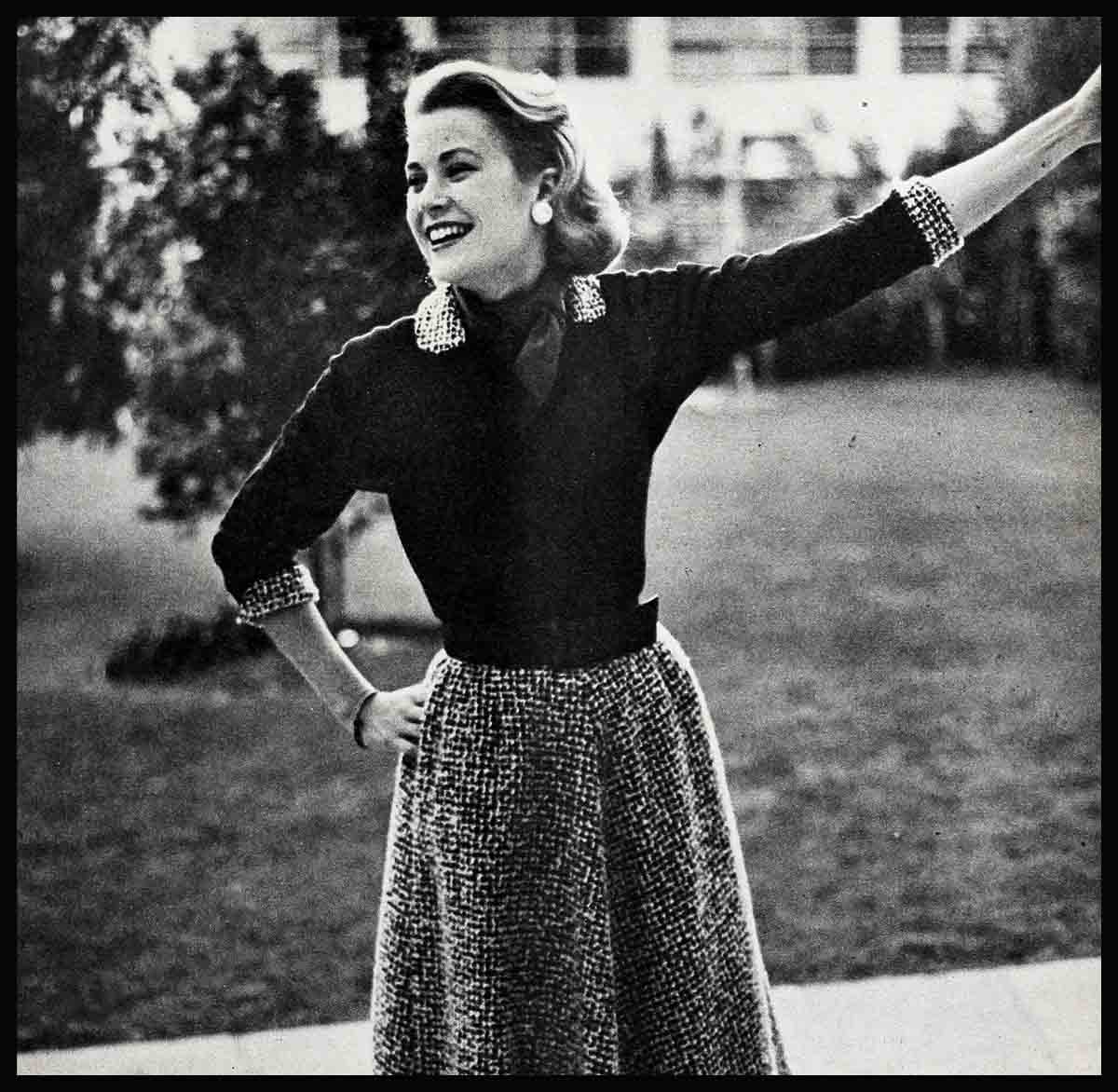
How Do You Do, Miss Kelly—Grace Kelly
Early last spring, a blond-haired young woman with a shy warm smile and a ladylike air casually walked into the Academy Awards presentations on the arm of the great Gable. There was nothing casual about the reaction she set up. It was the first time Gable could be coaxed to an Awards affair in years. Fans greeted the King and his queen royally, and Hollywood again raised a quizzical eyebrow and asked, “How does she do it?” Weeks later, on the arm of that perennial glamour boy, Bing Crosby, young Miss Kelly caused another Item at the Mocambo—despite the fact that married sister, Peggy Davis, chaperoned them. It was an Item not only because Mr. Crosby is a contender for the title of motion-picture’s Number One eligible male, but also because golden-haired Grace had done it again! In the few years since she arrived in Hollywood, her feminine charms have allured so many of the world’s most pursued men that Grace Kelly has won star billing as Hollywood’s Number One golden girl—and the gossips’ Number One news item.
None of this excitement seems to disturb Grace, who accepts it as a matter of course. In fact, the more Hollywood delves deeper into the nature of her charms and romances, the deeper Grace keeps the secret to herself.
One thing is certain. Grace is a swift-rising young actress who has literally everything. She has a beauty which brings an appreciative gasp from an audience, talent which brings appreciative comparisons to the young Bergman from critics and such a spectacular record of performance—leading roles in seven major pictures—that the studios have given her star billing before half of these pictures were even released.
This by no means circumscribes her aura of glamour. She also has a family background rich in both dollars and achievement and possesses a personal charm that makes her sought-after socially.
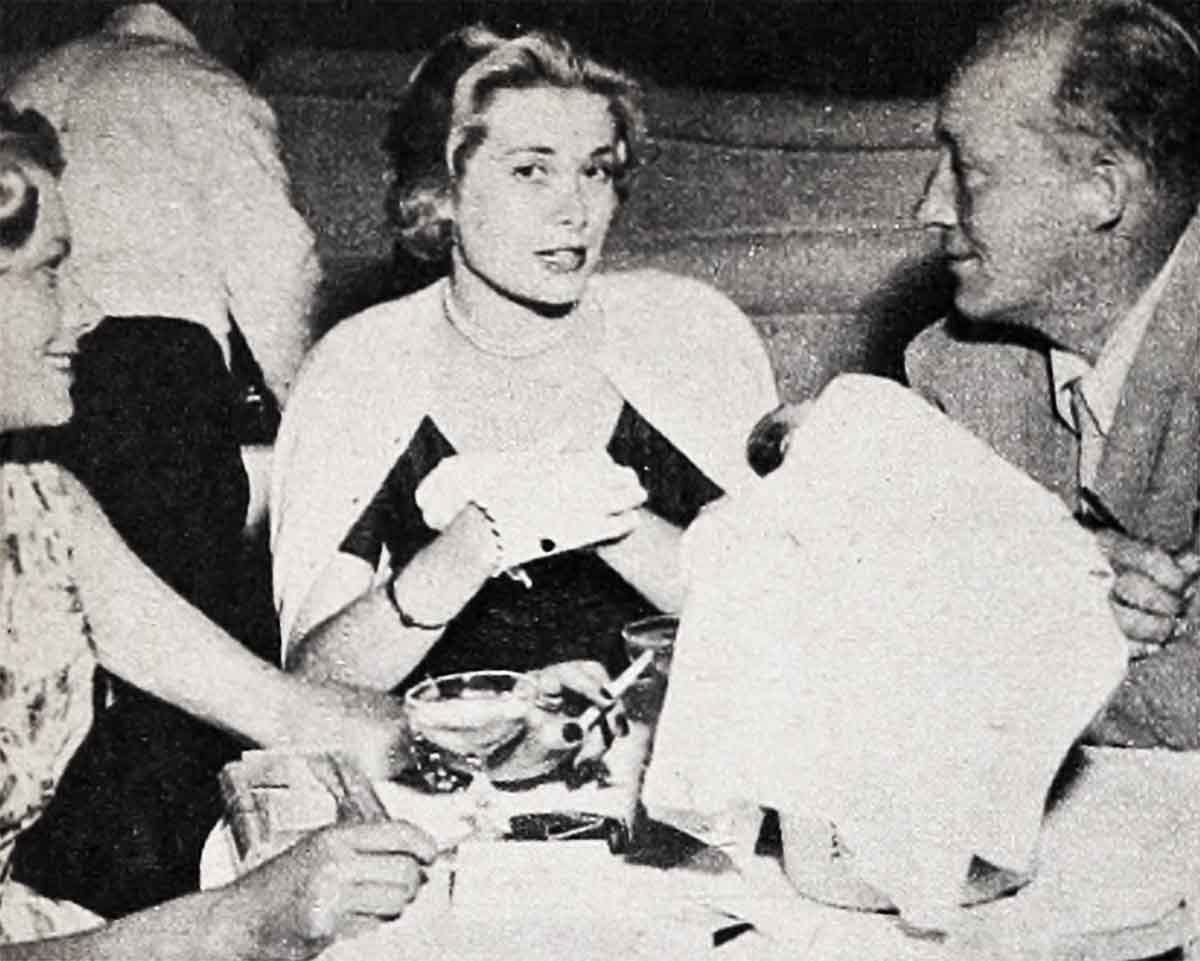
As for romance, Grace had lots of beaus before she met Oleg Cassini, Gene Tierney’s ex. But Oleg was her first serious romance. They toured part of Europe together and Oleg went east and met the Kelly family at their summer home at Ocean City, New Jersey, this past summer.
But amid the furor of columnists’ predictions, Grace maintained a firm alliance with Emily Post, working hard. living very quietly, very properly. And even if Grace is married to Cassini by the time you read this, the same aura of dignity will continue to surround her. She’s still reticent about discussing her personal affairs and whenever asked a direct question is adeptly evasive. To romance rumors with Oleg, she was exceptionally non-committal. “There is no one serious. My career comes first.” Finally admitted: “I won’t say that we won’t be married. And I’m not exactly saying we will. I like Oleg better than any man I know.”
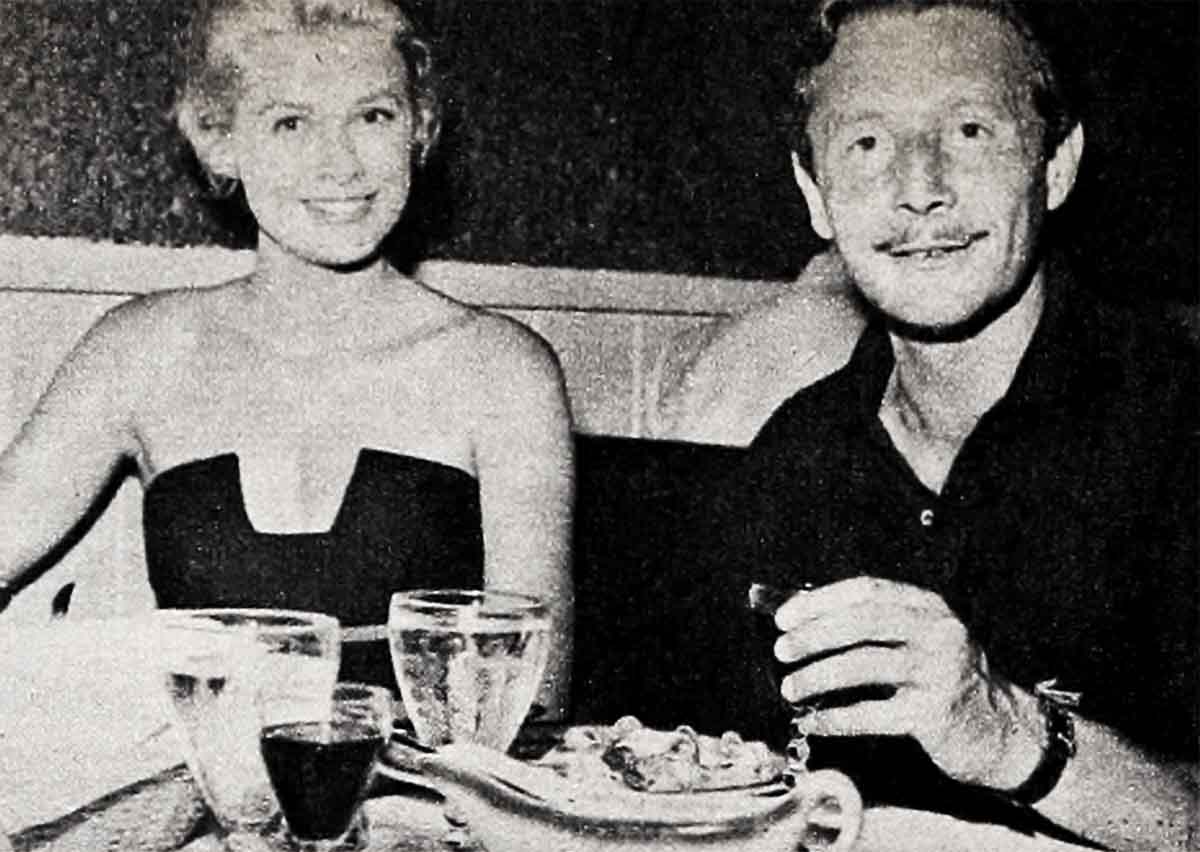
That quiet, matter-of-fact answer is but another example of the skill with which she has avoided flamboyant actions and foolish public statements. Seldom has Hollywood seen a young star display such sureness and composure. Many wonder how she acquired these qualities. A clue to the answer is found in her Philadelphia background where she was born to wealth, schooled for social position and disciplined to be self-reliant. It is confirmed by those who have since worked with her. They testify that from the start of her career this training has been the most valuable supplement to her talent. The home, which proved to be Grace Kelly’s first training school for the theatre and motion pictures, is a spacious, white-trimmed, red brick colonial house in the exclusive Falls of the Schuykill section. Its elegance and charm could make many a posh motion-picture set appear tawdry.
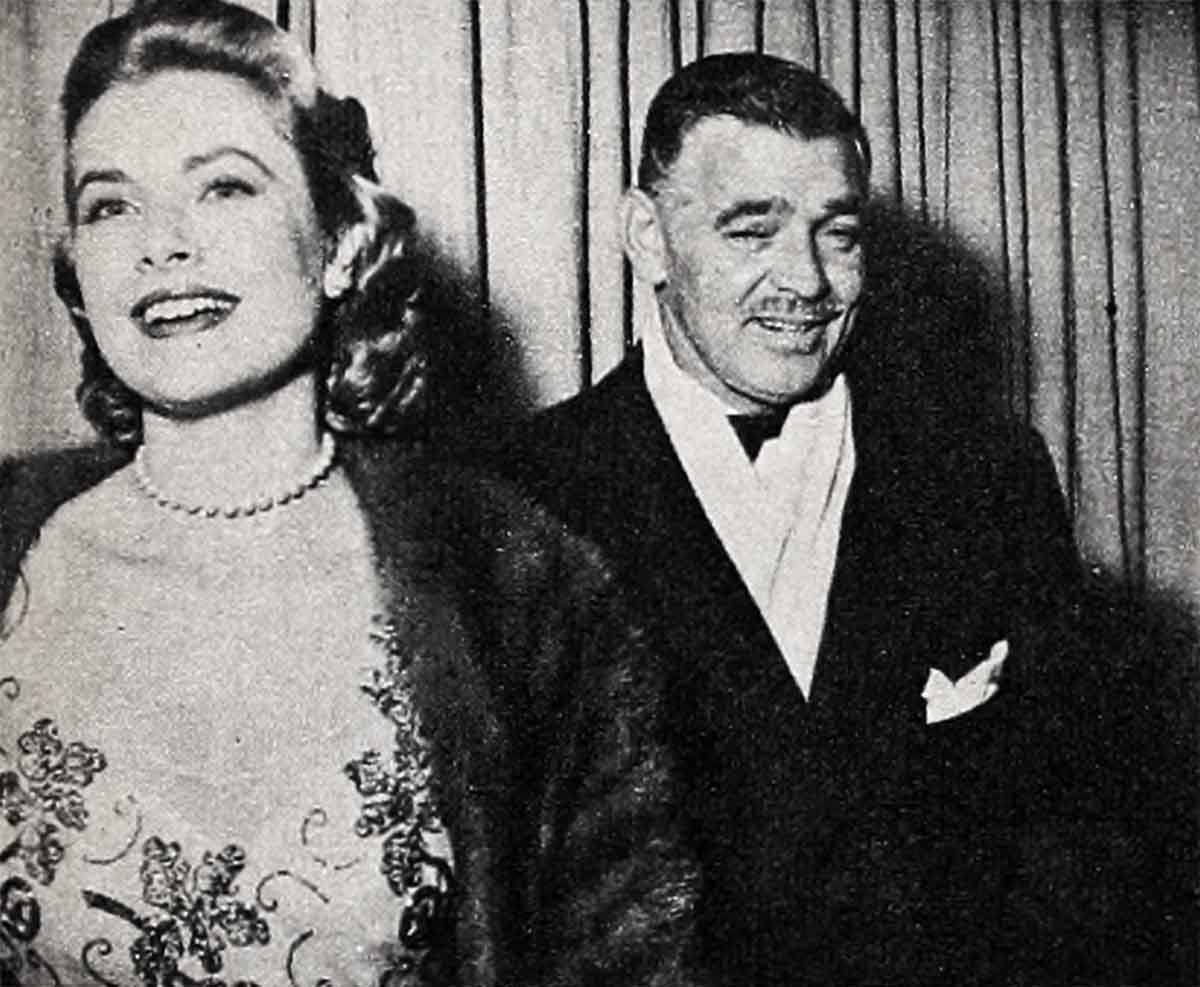
Built on a hill, it is surrounded by green and rolling lawns, great trees and flowering shrubs. At the rear, for the enjoyment of the active and athletic family are tennis and basketball courts. In the winter these are flooded to form a skating rink. Within a few minutes’ driving distance are the stables where Grace learned to ride well enough to win ribbons in horse shows, the country club where she played golf and the slopes where she skied. Further distant, at Ocean City, New Jersey, is the beach house where the family spends its summers.
And just as a movie set would suffer in comparison to this real-life establishment, so would many a motion-picture cast and plot appear dull when viewed in comparison with the fabulous Kellys.

All are good-looking, all highly intelligent, all have a zest for achievement and all possess the kind of charm which makes them stand out in a crowd.
Head of the family is tall, vigorous John Brendan Kelly, a man whose interest in his children leads him to say, “If the kids were doing anything—a race or the like—that’s where I was, too.”
The son of an Irish immigrant, he forged his own success, starting as an apprentice bricklayer when he finished grammar school. Today he heads an eighteen-million-dollar contracting firm which specializes in surfacing skyscrapers. Many a famed building along the Atlantic seaboard has during its construction flaunted the “Kelly for Brickwork” sign, including the United Nations structure.
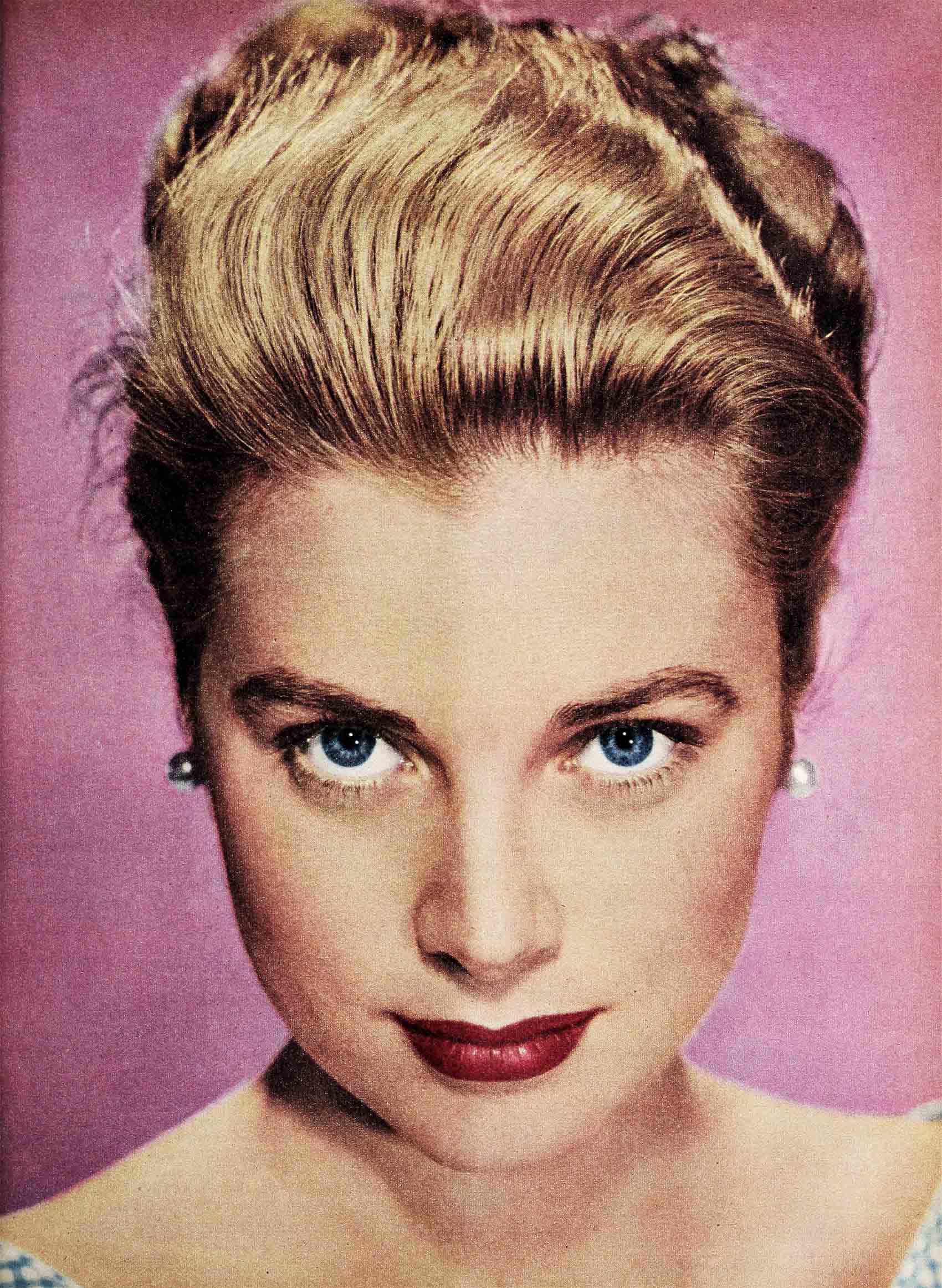
As a youth, he was a famed sportsman, winning the Olympic sculling championship in 1920. As a candidate for mayor of Philadelphia, he was defeated by a narrow margin. He is now vice president of the city’s park commission and has been influential in the founding and subsequent success of the Playhouse in the Park, an outstanding summer theatre.
Presiding over the household is Margaret Majer Kelly, a well-poised, socially accomplished beauty whom Grace resembles. In her youth, Mrs. Kelly, too, was a magazine cover girl and a model.
Eldest daughter is Peggy, now Mrs. George L. Davis, Jr. Although never on the professional stage, she’s a clever comedienne with a talent for painting and drawing. Youngest is Liz, whose dramatic work at the University of Pennsylvania has already drawn the attention of talent scouts.
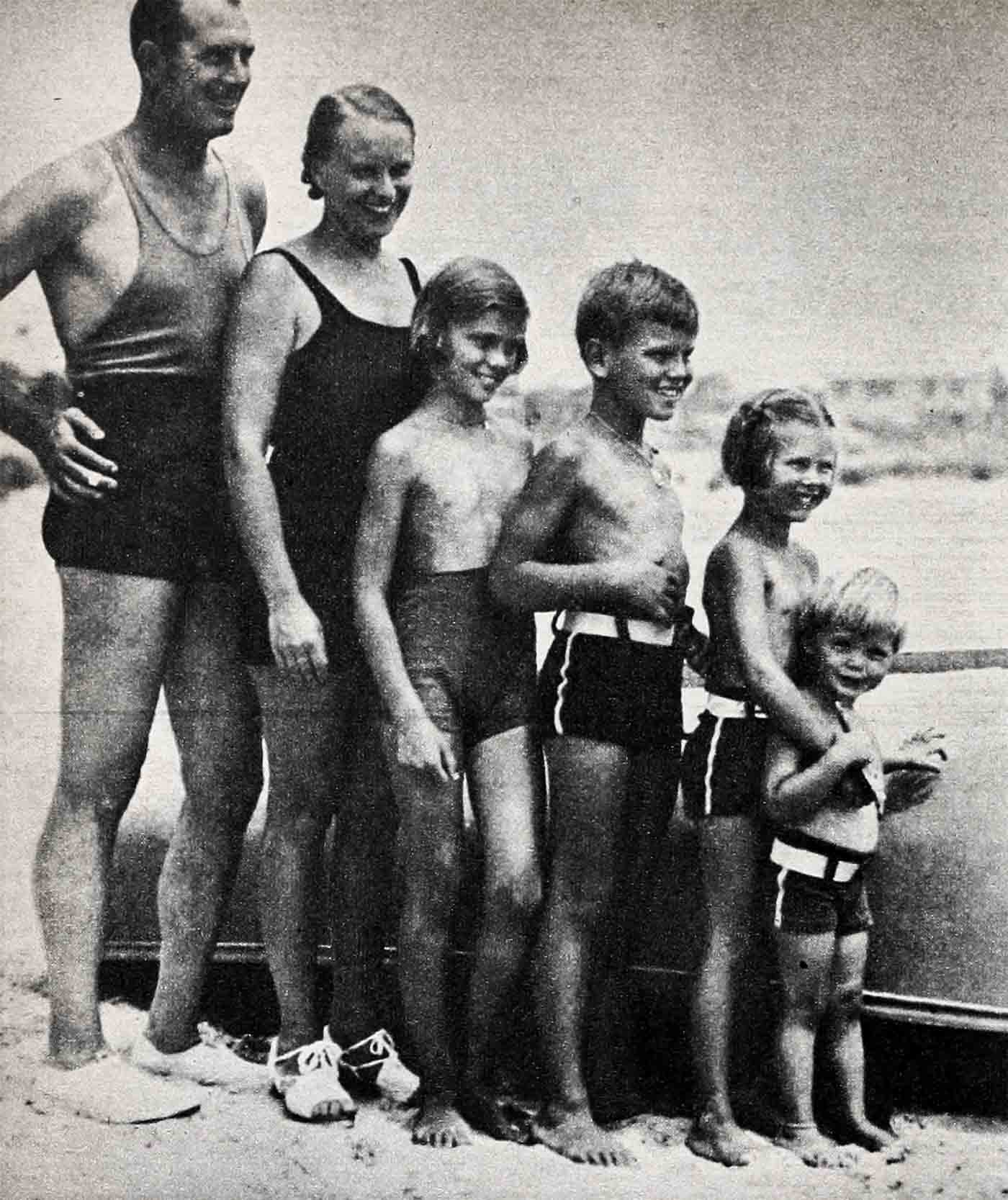
In between are Grace and John, Jr., whom the family calls “Kell.” Following in his father’s footsteps he, too, has become the greatest oarsman of his time, twice winning the Diamond Sculls and “in 1948 making a grand slam by also winning the European, Belgian and Swiss championships. He has won the American championship six times and the Canadian five times.
For Grace to hold her own in this lively, gifted, witty assemblage took some doing.
Says her mother, “She was the soft and gentle one, practically the pet of the family.”
Mrs. Kelly’s solution for Grace’s shyness was to give her, as well as the other children, regular household responsibilities. Even when, in typical kid fashion, they protested against the chores, the assignments held, for Mrs. Kelly made them with sound foresight. She explains, “I always felt children should contribute something toward maintaining their home. I believe many marriages fail because girls are unfair—they expect everything, but they are not prepared to carry their half of the responsibility. They don’t know how to care for a house properly themselves nor how to run one if they are lucky enough to have help.”

With this emphasis on self-reliance, the Kelly children learned how to take care of themselves. They also learned to be thrifty and abhor waste. The fact that John Kelly had prospered was no excuse for throwing things away. Says Grace, “It seemed to me I was always wearing my sister’s hand-me-down clothes.”
Firm as Mrs. Kelly’s discipline was, she also knew how to relax the rules on occasion. Theirs was a happy household. The lively young Kellys and their interested and interesting parents had so much fun together that their home drew all the other kids like a magnet. As youngsters, Grace and her sisters had many playmates. Later, they had plenty of beaus.
Grace’s interest in the theatre began early. Says her mother, “When she was a little girl playing dolls, she would have them tell a story, act out a play. She would change her voice to impersonate first one character and then another. She had a way of turning her make-believe into real.”
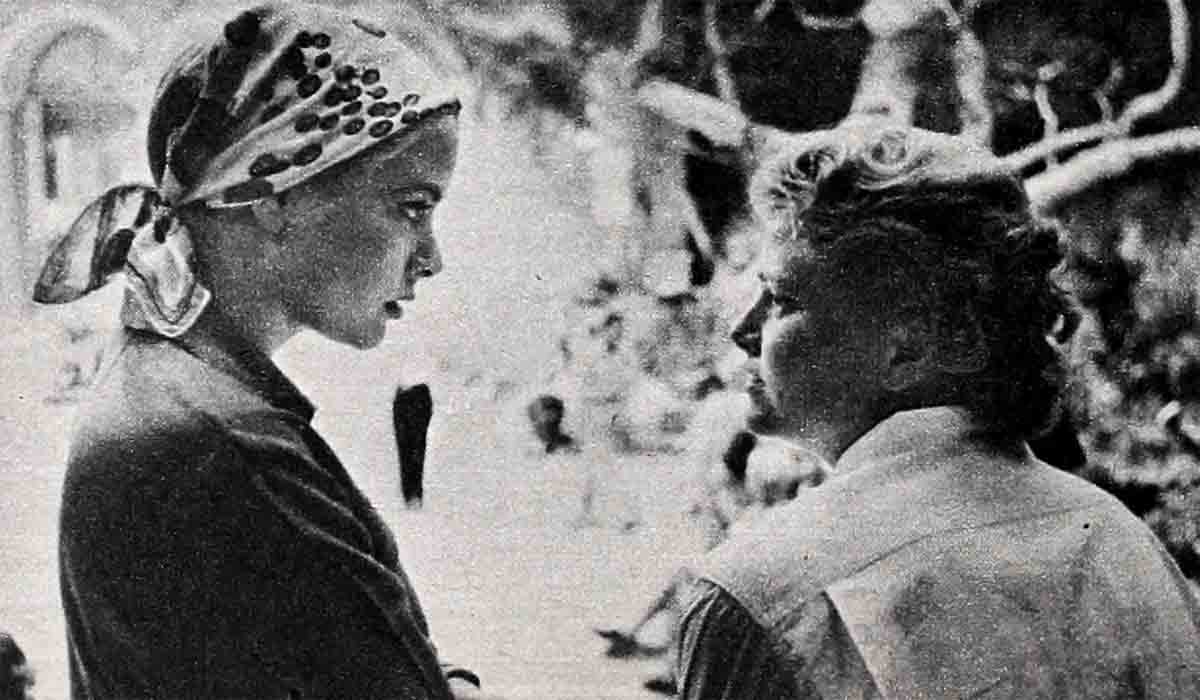
This was in line with family tradition. Her father’s brother, George, is a Pulitzer Prize-winning playwright and another brother, the late Walter Kelly, was a famed vaudeville performer.
Telling of that interest lies in John Kelly’s department. “All of the children have a gift in that direction,” he explains. “When they were all home, they always had a show of some sort going on.”
Impersonating friends was a favorite game. Proudly he says, “They could mimic anyone’s voice and they’d also get the gestures and character down pat. It was against their rules to tell who the person was supposed to be. If the rest of us couldn’t guess, the child doing the imitation felt it was his own fault—he hadn’t made the character clear enough.”
One event certain to turn the living room into a stage was Mr. Kelly’s return from a trip. Often he brought them clothes. Bathing suits from Florida were especially noteworthy presents. He recalls, “They would always model them for me. What a show they would put on.”
Soon Grace’s dreams reached beyond such impromptu productions. At ten, she announced she was going on the stage. At eleven, the family knew she meant it. Taking part in a little-theatre production, she played her role with the poise of a professional and the authority of one who already understood that an actress, by controlling her own action, also controls the audience reaction.
Watching her, theatre-wise John Kelly turned to his wife and said, “We’ve got a trouper on our hands.”

It was knowledge which brought a mixed reaction from the older Kellys. Years before, playwright George Kelly had absolutely forbidden his sister to go on the stage. John and Margaret Kelly elected a more tolerant attitude.
Says Mrs. Kelly, “We neither encouraged nor discouraged Grace. We felt she was entitled to have her fling at it. We hoped, though, that she would get it out of her system early and grow up to marry some nice boy.”
Says Mr. Kelly, “The stage really is too hard a life for a young girl. There are too many lonely nights when you’re out on the road, too many rough characters for a girl to deal with. But if Grace wanted it, we wouldn’t stop her.”
With this attitude, they permitted her to go to New York to study at the American Academy of Dramatic Arts.
It was there that the family training in self-reliance and the family habit of sighting a goal and achieving it were first put to the test. Grace, once the shy youngster, was not content to meander through as the well-financed daughter of a wealthy man. She turned the experience of the living-room fashion shows to good use and became a model.
Says Mrs. Kelly, “I didn’t like to see her work so hard, but she seemed to enjoy it and she was successful, so we didn’t interfere.”
She also commanded leading roles as a student actress. The best evaluation of her achievement here comes not from her family but from the M-G-M talent scout who witnessed both her junior and senior plays.
After seeing her in “Craig’s Wife,” written by her uncle, he reported, “She’s a lovely blond girl of eighteen who wears clothes well, has a refreshing and charming quality. She shows great promise for the theatre.”
This was at a time when M-G-M, because of studio circumstances, was making no screen tests. He sought to have them make an exception for Grace, and a year later, after seeing her in her senior play, “The Philadelphia Story,’ he repeated his request, writing: “There isn’t any doubt of this girl’s photogenic quality. She has distinction, poise, charm—in sum, everything other than professional theatre experience. I know of the time when we would not hesitate to test this girl and if there is any possible way to do so now, I feel that we should, because if we don’t some one else will and I feel they will have a future star on their hands.”
The test was again postponed, but finally in 1952, she signed her long-term contract with M-G-M.
Consequently, Grace’s first professional role came from Broadway rather than the movies. For a three-months run she appeared with the first of her big-name leading men, Raymond Massey, in “The Father.” From this came her first film contract for “Fourteen Hours.”
Acquiring her own apartment was another milestone of independence. Living first at the Barbizon Hotel for Women, she watched from the window of her little room the progress of a new apartment house which was going up and decided she wanted to live there. By a coincidence, which pleased her father, it turned out to be a building on which his firm was doing the brickwork. Taking a place of her own represented a transition from adolescence to adulthood. It indicated she intended to settle down for a while.
With that as home base, she went diligently to work, seeking radio and television roles. Again, talent scouts kept their eyes on her and she was brought to Hollywood to portray Gary Cooper’s wife in “High Noon.”
Grace herself has made the most cutting comment about that picture. “I was new then. I knew at the time I was bad. I realized movies were different from the stage and I had much to learn. I went back to New York and television to try to learn it.”
Getting back to television also meant getting back within reach of family weekends and with it a kind of coaching which no school nor director could give her. Mrs. Kelly recalls, “For a time she got nothing but young Englishwoman parts. You should have seen the take-offs the other children did. If ever she had tended to be conceited, they brought her down to earth fast. I’m afraid they did rather let her have it.”
Through family burlesquing of her parts and through appearing in seventy television shows, Grace Kelly so thoroughly learned her trade as an actress that she was able, after she signed with M-G-M and appeared in “Mogambo,” to be nominated for an Academy Award.
Her latest picture for her home studio is “Green Fire,” in which she is co-starred with Stewart Granger.
There’s no doubt that the training of the mother who wanted her daughters to be good wives, capable of carrying their half of the responsibility, has contributed to her present popularity with studios and fellow actors. Recently, William Holden, her co-star in “The Bridges at Toko-Ri” and “The Country Girl,” said, “She preserves an actor’s sanity. Some idiots I’ve known come to the set unprepared, but Grace always knows what she’s doing.”
But for all her success, the attitude of her parents remains as mixed as it was when she first announced she wanted to go on the stage. Although pleased and proud, they still haven’t changed their feeling that for a young girl, a theatrical career is a lonely thing. They have been urging Grace to take a long vacation, to come home and, for that period at least, resume her real life role in Philadelphia society.
Says her mother, a bit wistfully, “Do you know, with an apartment of her own, Grace has really turned into quite a good little cook. She enjoys it, too, I believe.”
Says her father, hopefully, “She made dinner for us the last time we visited her and she really put a good meal on the table.”
But despite new personal and social obligations Grace has shown little evidence that she is ready to become entranced with domesticity. She still has goals to reach and remarks candidly, “I seem to be the fad with the studios right now and I couldn’t be working harder to make it stick.”
THE END
—BY HELEN BOLSTAD
It is a quote. PHOTOPLAY MAGAZINE DECEMBER 1954




